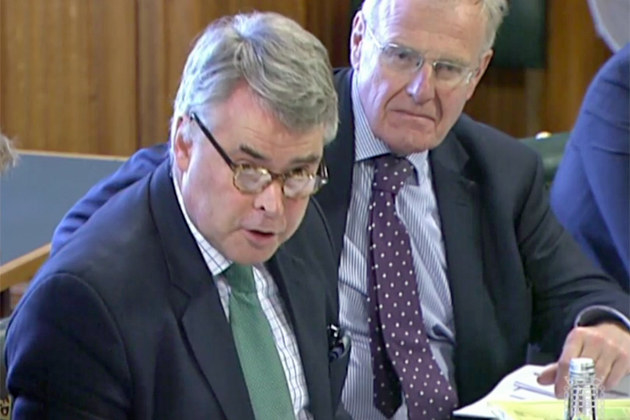
British backbench MPs have taken it in turns to rip into the world's biggest internet companies, with Facebook, Google, and Twitter's executives often left without answers to straightforward questions about how they deal with the abuse and harassment found on social media.
Yvette Cooper, chair of the home affairs committee, was the first to go after the assembled executives on Tuesday, leading the bipartisan panel in a three-hour grilling of the US-based tech giants about online abuse.

Cooper confronted Twitter's European vice president of public policy and communications, Sinead McSweeney, with a series of violent and abusive tweets about the Labour MP Diane Abbott that she'd reported previously, but that had not been removed.
"Perhaps you could explain why those tweets similarly reported would not have been taken down," Cooper said.
McSweeney replied: "I'm obviously not going to go into the content one-by-one, not least because some of the content would be unsuitable for the public record... [but] my initial read would suggest they do violate our policies."
She went on to describe the challenges Twitter faces by using a street-cleaning analogy: "If you're cleaning a street, you can clean a street every morning – you can't guarantee it'll be clean at 10am."
Cooper also brought up some tweets that were brought to Twitter's attention earlier this year by another member of the committee. According to the MP, the complaint was focused on whether the phrase "filthy Jew bitch" breached Twitter's terms of service.
"That tweet is still up on your platform. Why is it?" Cooper asked.
McSweeney replied: "I don't know the answer to that question."

Cooper went on to confront the executives about their companies' use of algorithms in serving up tailored content to users. She suggested they were radicalising and grooming potential extremists.
"The police have said to us that they're worried about online radicalisation and online grooming," Cooper said. "Isn’t the real truth that your algorithms ... are doing that grooming and radicalisation?"

Each member of the panel brought their own examples and specific gripes about Google, Twitter, and Facebook to the table.
Conservative MP Tim Loughton suggested the companies should address threats against people for their political beliefs, reading out tweets he'd found searching #KillATory on Twitter, including: "If everyone who tweeted about Thatcher killed one Tory each the country would be fixed in time for Corrie."
"You are profiting from the fact people use your platforms to further the ills of society," Loughton said to McSweeney. "And you're allowing them to do it and doing very little to prevent it."

Facebook's director of public policy, Simon Milner, said one of the reasons the social network doesn't take down the abuse is because some politicians like to "take on the trolls".
"We are very cautious about interfering in political speech," Milner said. "There are some politicians who actively want to take on the trolls and the abusers.
"They do not want this content taken down, they want to address it."
Later, Conservative backbencher Rehman Chishti held up a printed meme showing figures from the crusades with captions about killing Muslims: "That what you see there is not criticising religion, that's completely unacceptable, do you not accept that?"
Milner replied: "I would have to ask our expert teams to look at the content."

Britain First was brought up several times over the course of the morning after Twitter had suspended the far-right group's political leaders on the first day of a company crackdown on "hateful conduct" yesterday.
But Conservative MP Douglas Ross pushed Twitter as to why they had been verified in the first place. "I'd like to know what was the public interest in verifying those two accounts at that time," he said.
"I've said to you our verification policy was broken from top to bottom," McSweeney replied, going on to suggest Britain First deputy leader Jayda Fransen and leader Paul Golding were verified when the group was still a registered political party.
The far-right group's verified Twitter feeds became world news last month after US president Donald Trump retweeted three anti-Muslim videos posted by Fransen.

Several people, including BuzzFeed News, tried to get answers from Twitter about why the fringe group continued to remain verified on the platform.
Labour's Stephen Doughty asked Twitter again at the committee hearing: "When the issue first emerged about Britain First and Donald Trump and others in the last few weeks ... it took me nearly 24 hours to get a response from your senior staff when I raised concerns about the verified nature of the accounts, and it's taken you nearly three weeks to take any action. Do you think that's acceptable?"
McSweeney explained that the much talked-about changes to Twitter's verification policy took 30 days to implement, adding: "We've very openly put up our hands and said this is broken, therefore we're suspending the process of verification."
Doughty replied: "I'm sorry to say that the impression, and this is very specific to Twitter, is that you either can't cope or your organisation doesn't care about these issues."
Facebook's Milner also revealed the company would be reviewing whether to act on Britain First's wildly popular Facebook page, which has more than 1.7 million followers.
Long @CommonsHomeAffs session today with @Twitter @facebook & @YouTube - still not doing enough on extremism & hate… https://t.co/OwI4MvxbNk
At the end of the hearing, Cooper lectured the US companies, telling them they needed to do much more to keep people safe from abuse and threats on social media.
"It's about the kind of hate crime that destroys lives. It's about the type of harassment and abuse that can undermine political debate and undermine democracy," she said.
"You are among some of the richest companies in the world and that is why we need you to accelerate, and we need you to do more."
